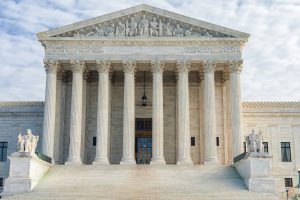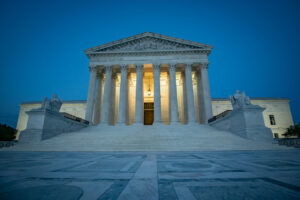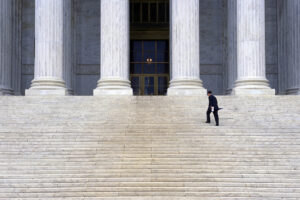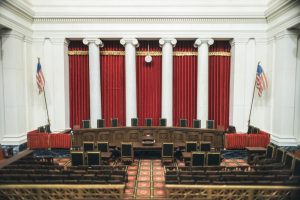Two companion statutes, Sections 204 and 205 of the Delaware General Corporation Law, permit Delaware corporations to fix defective transactions. For example, sometimes—perhaps all too often—a Delaware company may accidentally issue more stock than its charter or stock plan permits. The company can “fix” the error using these statutes, by “ratifying” the issuance of the stock and retroactively changing the corporate charter to increase the permitted number of shares. Doing so, however, has always required the company to first admit that it made a mistake.
That might no longer be true. The Delaware Court of Chancery’s recent decision in In re Lordstown Motors Corp.[1] suggests that Delaware companies can “ratify” corporate transactions which they merely believe may be bungled. Is Lordstown just an anomaly? Or is it the beginning of a broad expansion of Sections 204 and 205 that would allow companies to seek the Delaware Court of Chancery’s[2] blessing of transactions that they merely think might be defective?
Basic Background on Sections 204 and 205
In 2014, Delaware’s General Assembly enacted Sections 204 and 205 to enable Delaware companies to retroactively “fix” a company transaction that suffers from a mistake or defect. The statutes call such a mistake or defect a “defective corporate act.” Under Section 204, a Delaware company may “fix” defective corporate acts on its own, without the Chancery Court’s assistance, simply by passing appropriate board resolutions and following certain other processes. Section 205, though, allows a Delaware company to commence a proceeding to ask the Court of Chancery to “validate” the defective corporate act.
Until now, both of these sections required that the company acknowledge there was a defect—otherwise there was nothing to ratify or validate. In re Numoda Corp.[3] is a good example. That was an early Section 205 case in which the Chancery Court held:
- the Chancery Court is not free to exercise equitable powers under the statutes unless there was a “defective corporate act”;
- the Court’s equitable power under the statutes is designed only to “remedy the technical validity of the act or transaction”; and
- the Court’s equitable power under the statutes does not supersede “traditional fiduciary and equitable review.”
The Numoda opinion goes on to explain, “The Court does not now draw a specific limiting bound on its powers under Section 205, but it looks for evidence of a bona fide effort bearing resemblance to a corporate act but for some defect that made it void or voidable”, for “it is the legislation, not broad equitable theories, that instructs interested parties of the steps and requirements for ratification and validation of defective corporate acts and putative stock.”[4]
In a subsequent case, In re Genelux Corp.,[5] the Chancery Court concluded that Section 205 is a “remedial statute” that was designed only to “cure otherwise incurable defective corporate acts, not a statute to be used to launch a challenge to stock issuances on grounds already available through the assertion of plenary-type claims based on alleged fiduciary duty or common law fraud or a Section 225 action, if the stock had been voted.”[6]
In an unpublished (and often overlooked) decision, In re Baxter International, Inc., [7] the Chancery Court held that the purpose of Section 205 is to enable Delaware companies to seek judicial validity of “defective corporate acts” or corporate acts that suffered from “procedural defects.” There, Vice Chancellor Bouchard observed:
Section 204 and 205 of the Delaware General Corporation Law were recently enacted to provide certain avenues for the ratification or validation of defective corporate acts. Under Section 205, a corporation or a member of its board may submit an application to the Court of Chancery for a determination of the validity and effectiveness of defective corporate acts ratified under the related Section 204. The Court is also empowered by Section 205(a)(4), the provision that applies here, to “determine the validity of any corporate act or transaction.” The Court has used this power to validate, for example, an issuance of stock that suffered from procedural defects.[8]
In sum, Chancery Court cases before Lordstown consistently made clear that a Delaware company had to show that a transaction suffered from a defect that needed to be “fixed” before it could ask the Chancery Court to “validate” the transaction. But this might be changing. Recent case law appears to permit using Section 205 even when there is mere uncertainty about whether a corporation action was valid.
The Chancery Court Issues Its Decision in Lordstown To Resolve “Uncertainty”
On December 27, 2022, the Chancery Court decided Garfield v. Boxed, Inc.[9] In that case, the Chancery Court held that if a company had multiple series of common stock outstanding and wanted to issue more shares in order to accomplish a going-public merger with a special purpose acquisition company (SPAC), Section 242(b)(2) of the Delaware General Corporate Law requires each class of shares to vote separately to approve the new stock issuance.[10]
In the wake of Boxed, dozens of companies with multiple series of common stock that had issued new shares of common stock without following the voting procedure the Chancery Court required in Boxed filed Section 205 petitions to remedy potentially defective votes. Although some of these involved SPAC transactions, many did not. On February 20, 2023, Vice Chancellor Will held hearings on several of these petitions and approved each in rulings from the bench, including the first one, which was filed by Lordstown Motors Corporation in In re Lordstown Motors Corp.[11]
Lordstown Motors, a Delaware corporation, had filed a Section 205 petition seeking to validate under Section 205 an amendment to its corporate charter that increased the number of authorized Class A common shares, but which had not been approved by “a separate Class A vote” under Section 242(b)(2).[12] In granting the application, Vice Chancellor Will observed that “post-de-SPAC companies are experiencing uncertainty over their capital structures and the validity of their stock” and “a contrary ruling [i.e, to deny validation under Section 205] would invite untold chaos.”[13] Without a Section 205 validation of the potentially defective votes, Vice Chancellor Will held, similarly situated companies might be unable to satisfy auditors, complete periodic filings with the US Securities and Exchange Commission (SEC), obtain financing, or remain listed on a national securities exchange.[14]
Vice Chancellor Will added that in Lordstown, the Chancery Court could not “conceive of any legitimate harm that would result from validating” the amendment, and that “absent validation, a number of parties would face widespread harm.”[15] Consequently, Vice Chancellor Will determined that relief under Section 205 was “the most efficient and conclusive—and perhaps the only—recourse available.”[16] Vice Chancellor Will has scheduled hearings to handle waves of similar Section 205 petitions in the near future.
The key here is that Vice Chancellor Will approved using Section 205 to validate a corporate act, as long as there is “uncertainty” as to whether the corporate act is “void or voidable”—that is, so long as there is uncertainty as to whether a “defective corporate act” (as opposed to a corporate act that is legally valid and does not suffer from any defects) occurred:
Regardless of whether these acts are technically void or voidable due to a failure of authorization, the Company has encountered sudden and pervasive uncertainty as to its capitalization. Section 205 provides the court “with a mechanism to eliminate equitably any uncertainty” where questions of validity persist. The statute confers “substantial discretion on the court and, absent obvious procedural requirements, does not set a rigid outer boundary on the Court’s power.” The Delaware General Assembly intended Section 205 to provide an “adaptable, practical framework” for correcting blemished corporate acts “without disproportionately disruptive consequences.[17]
This decision—i.e., that Section 205 validation may be granted regardless of whether or not the company can show that an actual “void or voidable act” constituting a “failure of authorization” occurs—is directly at odds with prior decisions of the Chancery Court. As discussed above, those decisions held that Section 205 review can be granted only if the Section 205 applicant who seeks validation of a corporate act sufficiently shows that the corporate act in question is a “defective corporate act” or one which, at a minimum, suffers from a procedural defect.[18] The Lordstown decision also does not seem to fit within the language of the statute.[19] The statute on its face does not contemplate that it can be used to remedy uncertainty, only that it can used to fix what is undoubtedly a technical defect.
But Lordstown departs from this precedent: it requires Delaware companies to show the Chancery Court only that such a transaction might be defective.
Lordstown’s Potential Impacts
Because Lordstown appears to broaden Section 205 to cover corporate acts that merely might be defective, under Lordstown virtually any corporate act can be ratified that is within a Delaware corporation’s power to do, but for an uncertain defect. Thus, if the Chancery Court follows Lordstown going forward, Delaware companies and their boards will undoubtedly turn to Section 205 more frequently as a “belt-and-suspenders” approach to protecting corporate acts from attack by any shareholders who may, in the present or in the future, become disgruntled.
This strategy could turn out to be a mixed blessing. One the one hand, boards may take advantage of this looser standard by acting preemptively. In other words, they may file applications under Section 205 to ask the Chancery Court to “validate” corporate acts just to make sure that a possibly questionable corporate step they took is legally in order, with a view to achieving certainty and foreclosing future litigation. This could have the salutary effect of enabling companies to run their businesses without having to look over their shoulders for possible legal challenges.
But on the other hand, this more relaxed standard could embolden some bad actors. By definition, company insiders know more about the company’s inner workings and future prospects than any court possibly can. Indeed, the company chooses which facts to disclose to the court—so even without outright deception, this situation appears to be ripe for possible abuse. For example, a board intent on enriching itself might undertake acts of questionable or borderline legality that they might not otherwise have undertaken, knowing that they could seek judicial “validation” of such acts, long before the effects of their action become clear to the company’s shareholders, and without having to admit there is anything “wrong” (i.e., defective) with what the company did.
Conclusion
The Chancery Court’s recent decision in Lordstown departs from prior Chancery Court precedent which requires a Section 205 applicant to show that a company transaction suffers from a defect before asking the Court to validate the transaction. It remains to be seen if Lordstown is merely an outlier, or if it marks the beginning of a new and much more expansive Section 205 landscape.
The authors welcome any questions about this article and can be reached via email at [email protected] and [email protected].
Scott Watnik and Stuart Riback are litigation partners at Wilk Auslander, LLP in New York City.
The opinions expressed above are those of the authors and do not necessarily reflect the views of Wilk Auslander LLP, it clients or its respective affiliates. This article is for general information purposes and is not intended to be, and should not be taken as legal advice.
Del. Ch. C.A. No. 2023-0083-LWW, Feb. 21, 2023 ↑
The Delaware Court of Chancery is the only court with jurisdiction to hear matters pertaining to Sections 204 and 205. ↑
In re Numoda, 2015 WL 402265, at *8 n.96 (quoting H.R. 127, 147th Gen. Assemb., Reg. Sess. (Del. 2013). ↑
Id., 2015 WL 402265, at *10, 11 (emphasis added). ↑
In re Genelux, 126 A.3d. ↑
Id., at 667-668. ↑
In re Baxter International, Inc., 1/15/15 Tr. ↑
Id., 80:22-81:19 (emphasis added). ↑
C.A. No. 2022-0132-MTZ, 2022 WL 17959766 (Del. Ch. Dec. 27, 2022). ↑
Id., at *9. ↑
C.A. No. 2023-0083-LWW (Del. Ch. Feb. 21, 2023). ↑
Id., 14. ↑
Id., 3, 15. ↑
See id., at 25, 28. ↑
Id., 24. ↑
Id., 26. ↑
Id., 19-20 (emphasis added). ↑
See, e.g., In re Numoda, 2015 WL 402265 (Del. Ch. Jan. 30, 2015); In re Genelux, 126 A.3d 644 (Del. Ch. 2015), vacated, in part, on other grounds, 143 A.3d 20 (Del. Sup. 2016); and In re Baxter International, Inc., (Del. Ch. C.A. No. 11609-CB May 17, 2012). ↑
See, e.g,. 8 Del. C. § 204, subd. (h)(1) and (h)(2) (defining “defective corporate act” and “failure of authorization”). ↑











